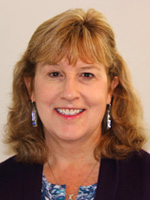
Candidate for Board Member-at-Large:
Jennifer Luebeck, Ed.D.
Associate Professor of Mathematics Education
Department of Mathematical Sciences
Montana State University
Bozeman, Montana
Past Participation and Involvement in AMTE and/or AMTE Affiliates(s)
- I’ve been an active member of AMTE for over 10 years. During that period, I have participated in nearly all the annual conferences– most years as a presenter, and more recently as a panelist, session coordinator, and committee chair.
- I’m involved with AMTE publications, contributing a chapter to the 3rd AMTE Monograph edited by Kathleen Lynch-Davis and Robin L. Rider and co-editing the 7th and final AMTE Monograph with Johnny Lott.
- I served on the Emerging Issues Committee (EIC) for the first three years of its existence, one year as a committee member and two years as chair. In that role, I coordinated the EIC’s planning of two annual Advocacy Breakfasts, helped identify and invite panelists, and moderated one panel.
What qualities do you bring to the AMTE Board Member at Large position?
My experience in higher education includes a wide spectrum of roles in mathematics education. After earning secondary licensure in mathematics, I taught for seven years at Northeast Wyoming (Sheridan) Community College. While earning a doctorate in mathematics education, I was research assistant for a five-year NSF-funded mathematics/science teacher preparation projects. My first faculty position at University of Northern Colorado heavily emphasized teacher preparation and field supervision. I’ve now been at Montana State University for 15 years. At this point in my career, I bring to the AMTE Board a well-balanced record of research, teaching, and outreach, and I’ve gained breadth of experience in working with K-12 teachers at all stages of their careers.
My instructional background spans K-12 and college-level mathematics; balances and blends content and pedagogy; incorporates face-to-face and online learning; and serves both prospective and practicing teachers. At MSU I teach pre-service elementary and secondary teachers, design graduate-level content and pedagogy courses for practicing teachers, and mentor doctoral students into research practices.
I have extensive experience with program and curriculum design in K-12 mathematics teacher education, In recent years I’ve helped redesign MSU’s secondary mathematics teaching option, reconceive the content course sequence for K-8 teachers, and create courses for practicing K-12 teachers addressing new standards for content and practice. I coordinate course and program design for MSU’s unique Master of Science program in secondary mathematics (MSMME), serving teachers nationwide in a distance learning format.
My beliefs about teaching and learning mathematics are evident in my approach to working with both pre-service and in-service teachers. I derive deep satisfaction guiding pre-service teachers on their journey into both the art and science of the teaching profession. I believe teachers in practice need ongoing opportunities for classroom-connected professional learning, and regularly incorporate such tasks into coursework for teachers ranging from action research projects in a 15-week graduate course to analyzing student work in a 3-week online module.
My scholarship is centered on developing innovative tools and frameworks for the effective preparation and professional development of K-12 mathematics teachers. I have studied pre-service teachers engaged in lesson study, issues related to instructional coaching, effective models of professional development, and teacher learning in the online environment. I am currently directing a multi-campus team in a five-year, $2 million state MSP project supporting implementation of Montana’s recently adopted mathematics standards. Our blended professional development model combines face-to-face workshops, online learning modules, and school-based peer learning.
The outreach component of my work involves creating opportunities for mentoring, professional development, and coursework for teachers whose access to learning is limited by time, distance, and expense. I design and teach online pedagogy and content courses, and have used the Web to facilitate online mentoring for rural mathematics teachers, to supervise classroom action research, and to support virtual teacher learning teams. A centerpiece of my five-year state MSP project is the design of a series of online modules to support K-12 teachers’ implementation of standards for mathematical content and practice.
What three goals do you think AMTE should make a priority?
- In terms of existing goals, I would prioritize “communication and collaboration among those involved in mathematics teacher education.” Through working with the Emerging Issues Committee, I realize the importance and value of shared expertise, access to colleagues, and centralized repositories of information.
- Linked to this goal is a priority on “professional growth of mathematics teacher educators.” How can we ensure that beginning MTEs have access to their peers as well as more experienced colleagues? What kinds of support can we provide to MTEs in smaller institutions where they may be alone in their role, or combining the MTE role with other duties?
- Given my experience with the Emerging Issues Committee, I am naturally interested in advocacy and how to collaborate with other organizations (NCTM, NCSM, AACTE) on shared interests and concerns.
